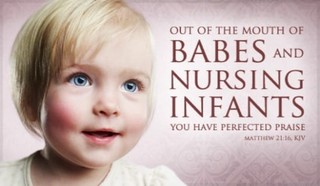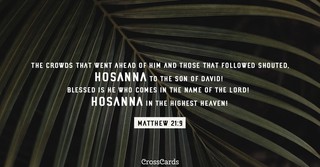
- Recent Translations
- All Translations
Matthäus 21:17 Meaning and Commentary
And he left them
The high priests and Scribes, confounded and put to silence, and as unworthy of his company and conversation;
and went out of the city;
of Jerusalem, partly to prevent being apprehended by his enemies before his time, and partly to remove all suspicion of seizing the city and government, and setting himself up as a temporal prince;
to Bethany;
which was about fifteen furlongs from Jerusalem, or almost two miles, ( John 11:18 ) . Hither he went to converse with his dear friends, Lazarus, and Martha, and Mary, who were all of this place, and where he could lodge and rest quietly. The name of the town is variously interpreted: according to some ancient writers {m}, it signifies "the house of obedience"; so Christ went from the disobedient and faithless city, to a place of obedience, where he had some faithful and obedient disciples: others read it, and so Munster's Hebrew Gospel, (hyne tyb) , "the house of affliction"; a suitable place for Christ to go to, who was about to suffer for the sins of his people. The Syriac version renders it (ayne tyb) , and which is interpreted "an house", or "place of business", as this town of Bethany was. We read F14 of (wnyh tyb lv twywnx) , "the shops of Bethany", which were destroyed three years before Jerusalem, because they made their affairs to stand upon the words of the law; that is, as the gloss explains it, they found that what was forbidden by the wise men, was free by the law: a great trade might be drove here for olives, dates, and figs, which grew hereabout in great plenty: mention is made in the Talmud of F15 (ynyh tyb ygp) , "the figs of Bethany": hence, as Christ departed from this place, the next morning he saw a fig tree. But the true etymology and signification of the name is (ynyha tyb) "the house", or "place of dates", the fruit of the palm tree: hence they that came from Jerusalem to meet Christ, might have their palm tree branches. One part of Mount Olivet abounded with olives, from whence it had its name; another part bore palm trees, and that was called "Bethany", from whence this town over against it had its name; and another part had great plenty of fig trees growing on it, and this called "Bethphage"; and that part of Jerusalem which was nearest to it went by the same name. We read F16 also of (ynyh tyb lv Uxrm) , "the washing place of Bethany"; which seems to me to be not a place for the washing and purification of unclean men and women, as Dr. Lightfoot thinks, but for washing of sheep; for the story is, that
``a fox tore a sheep in pieces at the washing place of Bethany, and the affair came before the wise men;''that is, at Jerusalem, to know whether that sheep might be eaten or no, since that which was torn was forbidden. And some have interpreted "Bethany, an house", or "place of sheep": but so much for this town, and what account is given of it.
And he lodged there;
either in the house of Lazarus, and his two sisters, or in that of Simon the leper; for it was eventide when he went out of Jerusalem, as Mark observes. The Ethiopic version adds, "and rested there"; and so Origen F17 reads it; and, according to Harpocratian F18, the word used by the evangelist signifies to lie down, and sleep, and take one's rest. Christ lodged here all night.
F13 Jerom. in loc. Origen. in Joan. p. 131. T. 2. & in Matt. p. 435, 446, 447. T. 1. Ed. Huet.
F14 T. Bab. Bava Metzia, fol. 88. 1.
F15 T. Bab. Pesachim, fol. 53. 1. & Erubin, fol. 28.
F16 T. Bab. Cholin, fol. 53. 1.
F17 In Matt. p. 447.
F18 Lexic. Decem Orator. p. 55.

